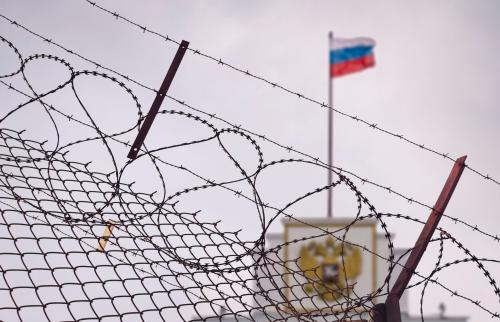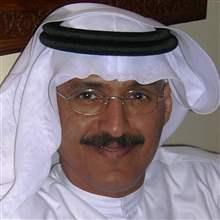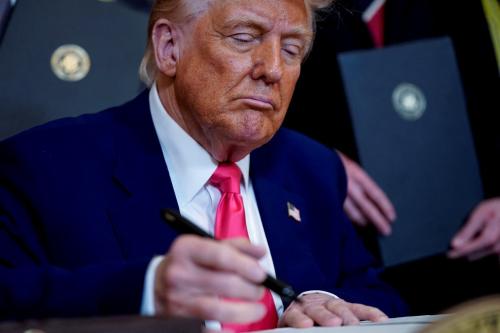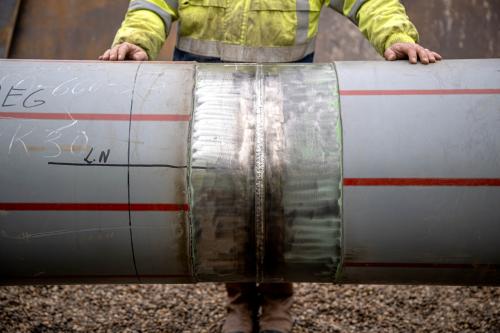

1:30 am +04 - 3:00 am +04
Past Event
Content from the Brookings Doha Center is now archived. In September 2021, after 14 years of impactful partnership, Brookings and the Brookings Doha Center announced that they were ending their affiliation. The Brookings Doha Center is now the Middle East Council on Global Affairs, a separate public policy institution based in Qatar.
The Brookings Doha Center (BDC) hosted a panel discussion on February 10, 2016, regarding the impact of low oil prices and taxation on the member states of the Gulf Cooperation Council (GCC). Panelists included Abdel Aziz Aluwaisheg, the GCC Assistant Secretary-General for Foreign Affairs; Fadi Makki, a senior visiting fellow at Georgetown University in Qatar and the Issam Fares Institute of Policy Studies at the American University of Beirut; and Robin Mills, a nonresident fellow at the BDC. Ibrahim Fraihat, a senior foreign policy fellow and the deputy director of the BDC, moderated the event, which was attended by members of Qatar’s diplomatic, academic, and media community.
Fraihat began the discussion by drawing attention to the decline in international oil prices and how it caused GCC countries to consider new sources of revenue. Currently, the price of oil hovers around $30 a barrel, although it traded at lower rates back in 1986 and 1997. He concluded his opening remarks by stating that the price drop seems more permanent this time because of the development of new technologies, the reemergence of major producers such as Iran and Iraq, and the slow economic growth in emerging markets that generally drove demand.
After noting the inherent difficulties involved in predicting oil prices, Mills elaborated on these points by discussing the emergence of alternative energy sources and new fuel extraction technologies such as shale production. He noted that the production of shale oil has proven to be more robust than expected. Producers have successfully managed to cut down their costs from an estimated $80 to around $50. Shale oil production has in fact become less expensive than deep-water megaprojects in the North Sea and Canada’s oil sands. However, although the demand for oil reached a new high last year, slower economic growth indicates that the demand for oil will drop this year, despite lower prices.
According to Mills, Saudi Arabia and the other countries of the Organization of Petroleum Exporting Countries (OPEC) will not cut production, even at the current prices, because these countries seek to maintain their share of the oil market. Saudi Arabia, the de facto leader of OPEC, believes that the shale companies will not survive this period of low pricing because their production method incurs a higher cost than conventional oil production. In fact, some smaller shale producers in the United States declared bankruptcy last year. From an economic standpoint, Saudi Arabia is in a better position to outlast shale oil producers and smaller oil producing states without cutting back on production due to exceptionally low production costs combined a $1.5 trillion portfolio of state-owned assets that will enable it to maintain state spending at similar levels as in the past for a while.
Makki then discussed the need for GCC countries to introduce economic reforms. A number of macroeconomic developments make reform a necessity as the global economy continues to struggle. The International Monetary Fund’s (IMF) economic forecast for 2016 conveys a low expectation for global growth and lower oil export revenues in oil producing countries, which together, may cause fiscal balances to deteriorate. Some recommended reforms include reduction of subsidies, the pursuit of a more diverse economic portfolio, and the enhancement of state revenue through taxation. Since, as members in the World Trade Organization, the GCC countries cannot freely raise tariffs, they have resorted to imposing the value-added tax (VAT) on consumers.
Introducing the VAT could provide a number of benefits to the GCC countries. A VAT levied at a rate of five percent could yield anywhere from 0.8 percent to 1.6 percent of gross domestic product (GDP) depending on the country. If implemented effectively, the introduction of the VAT could improve compliance on taxation. It could further provide administrators with detailed information about the processes that take place within the economy and could thus improve transparency and facilitate the development of targeted economic policies. The IMF and the World Bank recommend that the GCC countries cooperate with one another and introduce a single VAT rate. There are many opportunities for the private sector to partner with governments on various VAT implementation aspects, e.g., VAT collection through banks, outsourcing other aspects.
The conversation then shifted to a discussion on the effects of lower oil prices and a VAT on the politics of the region. Aluwaisheg contends that Saudi Arabia finds itself in a better position to handle this crisis as it manages an estimated $1.5 trillion portfolio of state-owned assets that includes equity stakes in Saudi companies; equity stakes in non-listed companies, such as Aramco; and reserves, cash, loans, and investments through sovereign vehicles. If necessary, Saudi Arabia could liquidate some of these assets in order to fund its budget while oil prices remain low.
Aluwaisheg believes that GCC governments should consider the current low oil prices an opportunity to cut government inefficiencies and waste. Accordingly, the GCC states should focus on cutting government spending in areas where it does not affect consumers. He contends that, far from simply increasing non-hydrocarbon state revenues, the VAT is a tax reform that fills gaps in the current tax structure and allows for the removal of some existing taxes and fees. Aluwaisheg believes that oil prices will remain low for the next few years. The years when oil prices grew to triple digits were outliers; the oil market is correcting itself and adjusting to new global economic and political developments. Thus, the GCC members must adapt to the shift in the global economy by implementing lasting reforms and diversification.
Fraihat asked the panel how the VAT will affect the average citizen living in a GCC country. The panel agreed that the average citizen will not feel the economic effect of the VAT if the GCC countries follow the recommendations of the World Bank and IMF and levy the VAT at a rate of five percent. If the VAT exceeds the rate of five percent and increases to double digits, commodity price levels will increase substantially for citizens which may lead them to demand political reform. Other targeted tax reforms such as increasing taxation on “sin products” like cigarettes and alcohol and on luxury goods are additional examples of taxes that increase government revenue while preventing the tax burden from affecting the lower class.
The discussion concluded with a few final questions concerning the long term effects of low oil prices on the GCC. With the current saturation of oil supply and decline in global demand, prices may remain at this low equilibrium. Slow growth in China’s economy, the increase in U.S. oil production, and Iran’s reentry to the oil market will all contribute to keeping oil prices low. However, far from being negative, such low prices can serve as an opportunity for GCC countries to make some productive changes in relation to government efficiency, reducing bureaucracy, and increasing sustainability and accountability.



Robin Brooks, Ben Harris, Liam Marshall
June 5, 2025

Barry G. Rabe
April 21, 2025

March 11, 2025